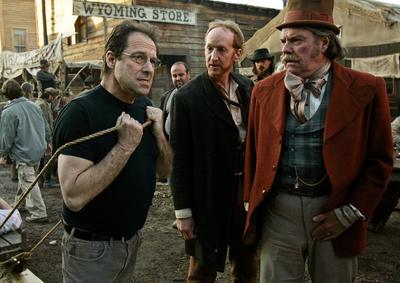Gifted television writer David Milch gambled and lost so much that he pretty much ruined schadenfreude for everyone.
The former Yale Literature professor, who co-created of NYPD Blue and Deadwood, had lavish homes, $100 million and the esteem of the industry, but a rabid racetrack habit has left him with only the latter. He continues working as he lives in shadows of his former life, subsisting on a $40-a-week allowance and hopelessly in arrears to the IRS. Milch is the subject of a jaw-dropping Hollywood Reporter story by Stephen Galloway with Scott Johnson, which could be called a cautionary tale, except it probably can only be fully understood by those drawn to wagering every last comfort on the nose of a horse. In other words, if you can see yourself in it, you probably won’t be able to see yourself out of it.
An excerpt:
The writer-producer always was considered brilliant but also eccentric: His writing style consists of dictating his thoughts, sometimes while lying prone on the ground, often surrounded by other writers.
“He’s obviously a genius and extraordinarily talented, and he’s got a fire that burns in him brighter than anyone else,” says horse trainer Darrell Vienna, who helped Milch connect with real-life cowboys and horse wranglers while doing research forDeadwood. “But it can cause a lot of damage. He’s an extraordinary person. He’s insightful in everything he does — people, horses, everything — and he’s very insightful about himself, and therein lies the rub. He’s a person of extremes.”
A self-confessed former drug user in the ’80s (“I was a bitter heroin addict at the time,” he told an MIT communications forum in 2006) as well as a gambler, Milch is well-known at racetracks, where he once owned several horses. Racing and gambling were the themes of his HBO series Luck, canceled in 2012 after three horses died during filming.
“He was one of the most devoted gamblers,” says John Perrotta, an author and adviser on that show. “He was very serious about it, and he was a very good handicapper.”
Handicapping is the process by which odds are analyzed in a way that improves the chances of winning. You can, for instance, make what’s called an “exotic bet,” in which you guess which two or three or four horses will be the first to cross the finish line and in what order. The formation of these exotic bets was the subject of the first scenes of Luck, which Milch once described as his “love letter” to horse racing. Perrotta says they came directly from his experiences with the writer.
One acquaintance familiar with Milch’s gambling habits describes a man who couldn’t stop betting once he got started: “He was crazy. He’d bet thousands and thousands of dollars. He’d bet every race.”•

